Alfa Romeo Junior vs Mercedes EQV – Differences & prices compared
Both models have their strengths – but which one suits you more?
Compare performance, efficiency, price and space directly: Alfa Romeo Junior or Mercedes EQV?
Costs and Efficiency:
Looking at overall running costs, both models reveal some interesting differences in everyday economy.
Alfa Romeo Junior has a decisively advantage in terms of price – it starts at 25700 £, while the Mercedes EQV costs 50700 £. That’s a price difference of around 25076 £.
In terms of energy consumption, the advantage goes to the Alfa Romeo Junior: with 15.10 kWh per 100 km, it’s convincingly more efficient than the Mercedes EQV with 27.10 kWh. That’s a difference of about 12 kWh.
As for range, the Alfa Romeo Junior performs somewhat better – achieving up to 410 km, about 46 km more than the Mercedes EQV.
Engine and Performance:
Power, torque and acceleration say a lot about how a car feels on the road. This is where you see which model delivers more driving dynamics.
When it comes to engine power, the Alfa Romeo Junior has a clearly perceptible edge – offering 280 HP compared to 204 HP. That’s roughly 76 HP more horsepower.
In acceleration from 0 to 100 km/h, the Alfa Romeo Junior is decisively quicker – completing the sprint in 5.90 s, while the Mercedes EQV takes 10.30 s. That’s about 4.40 s faster.
In terms of top speed, the Alfa Romeo Junior performs distinct better – reaching 206 km/h, while the Mercedes EQV tops out at 140 km/h. The difference is around 66 km/h.
There’s also a difference in torque: Mercedes EQV pulls minimal stronger with 365 Nm compared to 345 Nm. That’s about 20 Nm difference.
Space and Everyday Use:
Beyond pure performance, interior space and usability matter most in daily life. This is where you see which car is more practical and versatile.
Seats: Mercedes EQV offers somewhat more seating capacity – 6 vs 5.
In curb weight, Alfa Romeo Junior is significantly lighter – 1380 kg compared to 2666 kg. The difference is around 1286 kg.
In terms of boot space, the Mercedes EQV offers significantly more room – 1410 L compared to 415 L. That’s a difference of about 995 L.
In maximum load capacity, the Mercedes EQV performs decisively better – up to 5010 L, which is about 3730 L more than the Alfa Romeo Junior.
When it comes to payload, Mercedes EQV significantly takes the win – 834 kg compared to 420 kg. That’s a difference of about 414 kg.
Who wins the race?
The Alfa Romeo Junior proves to be is largely superior and therefore becomes our DriveDuel Champion!
Alfa Romeo Junior is the better all-rounder in this comparison.
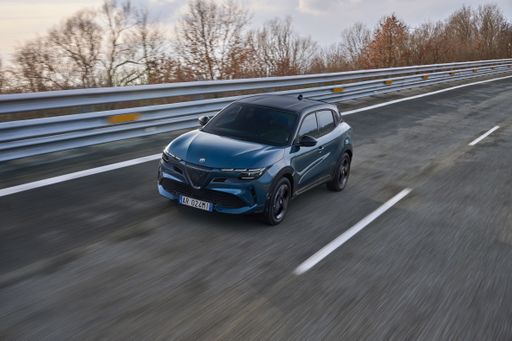 @ Alfa Romeo / Stellantis Media
@ Alfa Romeo / Stellantis Media
Alfa Romeo Junior
Alfa Romeo Junior
The Alfa Romeo Junior captures the essence of Italian design with its sleek lines and compact dimensions, making it an icon of elegance and performance. With a spirited driving experience and a charming retro aesthetic, it appeals to enthusiasts and casual drivers alike. This delightful car embodies the brand's rich heritage while remaining a fun and engaging option for those seeking a unique automotive experience.
details @ Alfa Romeo / Stellantis Media
@ Alfa Romeo / Stellantis Media
 @ Alfa Romeo / Stellantis Media
@ Alfa Romeo / Stellantis Media
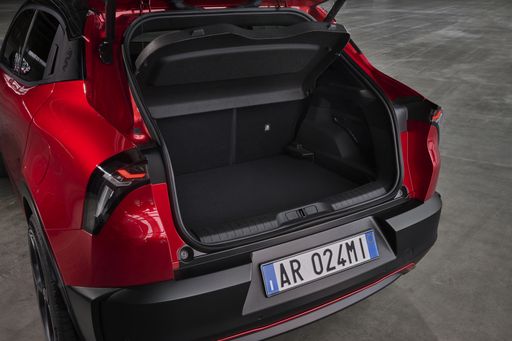 @ Alfa Romeo / Stellantis Media
@ Alfa Romeo / Stellantis Media
Mercedes EQV
The Mercedes-Benz EQV stands out as a versatile electric vehicle combining luxury with practicality, making it an ideal choice for environmentally conscious families. With its spacious interior and sleek design, it offers a premium driving experience that aligns with the brand's reputation for quality and innovation. As a sustainable option in the realm of people carriers, it exhibits the perfect balance between cutting-edge technology and everyday usability.
details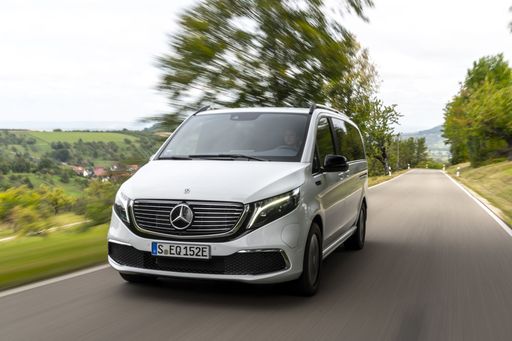 @ Mercedes-Benz Group Media
@ Mercedes-Benz Group Media
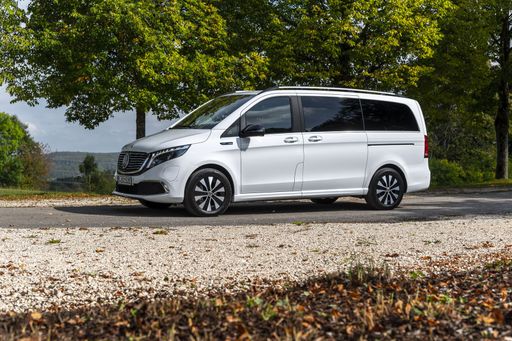 @ Mercedes-Benz Group Media
@ Mercedes-Benz Group Media
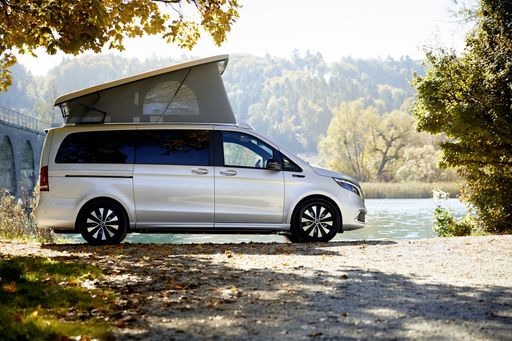 @ Mercedes-Benz Group Media
@ Mercedes-Benz Group Media
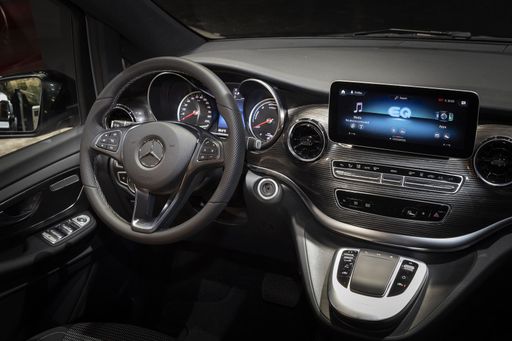 @ Mercedes-Benz Group Media
@ Mercedes-Benz Group Media
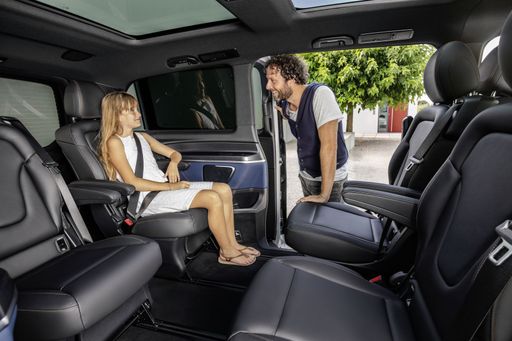 @ Mercedes-Benz Group Media
@ Mercedes-Benz Group Media
 @ Alfa Romeo / Stellantis Media
@ Alfa Romeo / Stellantis Media
|
 @ Mercedes-Benz Group Media
@ Mercedes-Benz Group Media
|
|
|
|
Costs and Consumption |
|
|---|---|
|
Price
25700 - 41600 £
|
Price
50700 - 54400 £
|
|
Consumption L/100km
4.8 - 5.4 L
|
Consumption L/100km
-
|
|
Consumption kWh/100km
15.1 - 17.5 kWh
|
Consumption kWh/100km
27.1 - 27.5 kWh
|
|
Electric Range
344 - 410 km
|
Electric Range
244 - 364 km
|
|
Battery Capacity
0.4 - 51 kWh
|
Battery Capacity
60 - 90 kWh
|
|
co2
0 - 119 g/km
|
co2
0 g/km
|
|
Fuel tank capacity
44 - 45 L
|
Fuel tank capacity
-
|
Dimensions and Body |
|
|---|---|
|
Body Type
SUV
|
Body Type
Bus
|
|
Seats
5
|
Seats
6
|
|
Doors
5
|
Doors
5
|
|
Curb weight
1380 - 1689 kg
|
Curb weight
2666 - 2863 kg
|
|
Trunk capacity
340 - 415 L
|
Trunk capacity
1030 - 1410 L
|
|
Length
4173 mm
|
Length
5140 - 5370 mm
|
|
Width
1781 mm
|
Width
1928 mm
|
|
Height
1505 - 1538 mm
|
Height
1920 - 1923 mm
|
|
Max trunk capacity
1205 - 1280 L
|
Max trunk capacity
4630 - 5010 L
|
|
Payload
390 - 420 kg
|
Payload
637 - 834 kg
|
Engine and Performance |
|
|---|---|
|
Engine Type
Electric, Petrol MHEV
|
Engine Type
Electric
|
|
Transmission
Automatic
|
Transmission
Automatic
|
|
Transmission Detail
Dual-Clutch Automatic, Reduction Gearbox
|
Transmission Detail
Reduction Gearbox
|
|
Drive Type
Front-Wheel Drive, All-Wheel Drive
|
Drive Type
Front-Wheel Drive
|
|
Power HP
136 - 280 HP
|
Power HP
204 HP
|
|
Acceleration 0-100km/h
5.9 - 9.1 s
|
Acceleration 0-100km/h
10.3 - 12.1 s
|
|
Max Speed
150 - 206 km/h
|
Max Speed
140 km/h
|
|
Torque
230 - 345 Nm
|
Torque
365 Nm
|
|
Number of Cylinders
3
|
Number of Cylinders
-
|
|
Power kW
100 - 207 kW
|
Power kW
150 kW
|
|
Engine capacity
1199 cm3
|
Engine capacity
-
|
General |
|
|---|---|
|
Model Year
2024 - 2025
|
Model Year
2024
|
|
CO2 Efficiency Class
A, C, D
|
CO2 Efficiency Class
A
|
|
Brand
Alfa Romeo
|
Brand
Mercedes-Benz
|
What drive types are available for the Alfa Romeo Junior?
Available configurations include Front-Wheel Drive or All-Wheel Drive.
The prices and data displayed are estimates based on German list prices and may vary by country. This information is not legally binding.
